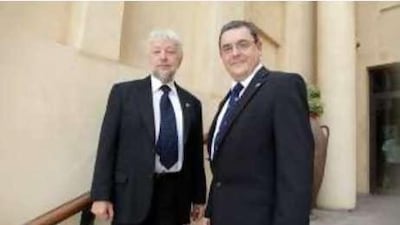DUBAI // The first overseas university to open in Dubai International Academic City (DIAC) five years ago has begun work on a Dh250 million expansion. The extended campus at Heriot-Watt University will accommodate 2,500 students, up from the current 1,400. The development will use solar-power water heating and motion-sensor lighting to conserve energy.
An additional 1,000 students are expected to enrol after the summer break, when work is complete. New courses on offer include architectural engineering, food science and psychology for business. The campus of the Edinburgh-based university specialises in vocational subjects such as engineering, construction project management and fashion design and is the largest in DIAC. "The programmes we offer are in demand," said its principal, Prof Steve Chapman. "They are great for graduate employment. We look at the statistics of where our graduates are employed within their first year of leaving the university in a graduate-level job and base what we teach here on that."
The expansion comes after Michigan State University's recent announcement that it was shutting down all its undergraduate programmes after just two years. The high-ranking American university had enrolled fewer than 150 students in its five undergraduate programmes in two years in Dubai and rang up millions of dollars of debt. In Ras al Khaimah, the three-year-old George Mason University, also a US institution, closed last year after funding problems.
In spite of the economic downturn, said Prof Brian Smart, the executive dean and head of Heriot-Watt's Dubai campus, the university has "made good use of the natural fit of our courses to Dubai's needs". Prof Chapman said the diversity and relevance of its programmes have helped, as has its fee structure, which starts at Dh34,000 per year. Michigan State's tuition was about Dh58,000 per year. About Dh2 million in scholarships is given to needy students each year. Prof Smart added the university's degree entry programme, similar to a foundation programme, ensures that students do not drop out.
Mary Corrado, director of AMIDEAST, the non-profit educational organisation that helps facilitate programmes such as the US State Department's Fulbright Scholars, said it is vital for the UAE to have a healthy and competitive educational system, where foreign universities offer a diverse range of courses. She said there are many factors that contribute to the success of foreign universities here, including fees, entry criteria and the courses offered.
"If you look at the courses Heriot-Watt offers, most of the master's programmes are one year, or you can take it in two years part time. Many of the undergraduate programmes are three years as opposed to four in US universities," she said. Tim Carnley, from the British Council, which facilitates study in Britain or British institutions for students all over the world, said that one of the main benefits of a free zone like DIAC is that students have access to international standards of education from internationally recognised institutions, without having to travel abroad.
"It's important to have a range of institutions that meet the needs of such a cosmopolitan population," he said. @Email:mswan@thenational.ae

